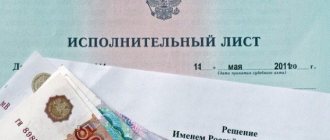Personal income tax (NDFL) is a tax that everyone “automatically” pays from their salary.
More precisely, the employer pays it for us. The situation changes dramatically when a person receives income that is not related to his employment relationship, for example, income from the sale of property or from renting out an apartment. In some cases, such income must be declared independently and personal income tax must be paid on it. Not everyone does this anymore. Let’s look at what theoretically could be the consequences of failure to pay such a tax. All individuals are required to pay income tax. This tax applies to income from the sale of property that you have owned for less than 3 years, income from rental property received abroad, and many others, including winning the lottery or betting on sports. The personal income tax rate varies depending on the presence of tax residence and types of income. Thus, for a tax resident the rate is 13%, and for a tax non-resident – 30%. A foreigner can also be a tax resident if he has spent more than 183 days in Russia over the past 12 months. For certain types of income, the rate can be 35%.
However, not all income is subject to personal income tax. For example, income received from the sale of property that has been in your ownership for more than 3 years is exempt from this tax. As well as income in the form of an inheritance, and income received through a gift agreement (however, even here there are some nuances and features). Personal income tax also does not need to be paid on alimony, grants, scholarships, unemployment benefits, etc. A full list of exceptions can be found here.
In most cases, personal income tax is paid for us either by the employer or another tax agent. For example, in the case of investments, in most cases this is done by the broker. But there are situations when an individual must independently declare their income. Typically, these are situations in which the individual does not interact with any withholding agent. Probably the most common case is renting out an apartment.
So, what happens if for some reason you have not declared your income?
Firstly, in order to be held accountable for non-payment of personal income tax, the taxpayer’s guilt must be proven. So, if the taxpayer had an obligation to pay personal income tax, but he did not file a declaration and did not pay the tax, then the guilt is obvious and entails liability provided by law.
It’s another matter if the personal income tax was not paid for any reason by a tax agent, for example, an employer. The taxpayer should not be held responsible for his actions or inaction. The tax agent himself must notify the taxpayer and the Federal Tax Service that he did not withhold personal income tax properly. If the taxpayer did not receive such a notice and did not know that the tax was not withheld, then the taxpayer is not to blame for this, nor is he liable.
more details This issue, in particular, is addressed in the letter of the Ministry of Finance dated June 10, 2013 No. 03-04-05/21472
Failure to pay personal income tax is in itself an offense, however, aggravated by the failure to file a 3-personal income tax return, it leads to a fine of 20% to 40% of the amount of unpaid tax: 20% in the case of unintentional failure to pay and 40% in the case of intentional failure. Accidental non-payment (full or partial) includes cases when the taxpayer, for example, declares less income than he actually received, or indicates in the declaration tax deductions that he actually did not have the right to apply.
Article 119 of the Tax Code of the Russian Federation implies a fine for the absence of a declaration in the amount of 5% of the amount of tax unpaid according to the declaration for each full or partial month from the day established for its submission, but not more than 30% of this amount and not less than 1,000 rubles.
In some cases, penalties may apply. The tax office has the right to charge additional tax for days of delay for the last three years in the amount of 1/300 of the key rate of the Central Bank for each day of delay. As a rule, penalties are calculated as follows: the refinancing rate of the Central Bank of the Russian Federation, which was in effect at the time of delay, is divided by 300, and then the resulting number is multiplied by the amount of tax not paid on time and the number of days of delay.
The tax office has the right to demand payment of debt, penalties and fines within 3 months from the moment the violation was discovered (in this case, from the moment the act was drawn up). Tax authorities conduct a desk audit to determine the extent of tax violations, including those regarding individuals; based on the results of the audit, an arrears report is drawn up. It should be noted that usually the period for claiming arrears is about 3 years. For a period of more than 3 years, claiming the amount of arrears is quite problematic.
more details The problematic nature is noted by civil servants themselves in the resolution of the Federal Antimonopoly Service of the Moscow District dated November 10, 2011 No. A40-145221/10-13-878 and in the letter of the Ministry of Finance of Russia dated October 29, 2008 No. 03-02-07/2-192.
After checking and drawing up an arrears report, tax authorities take actions to collect taxes through collections on bank accounts, against property, etc.
In order not to aggravate your situation due to this tax violation, you need to submit an “adjusted” 3-NDFL declaration, which will indicate all arrears.
For malicious non-payment of taxes, you may also face criminal liability. Criminal liability and criminal punishment depend on the amount of arrears for the last three years. So, according to Article 198 of the Criminal Code of the Russian Federation, if the total debt is more than 900 thousand rubles, this amount will exceed 10% of the total amount of tax obligations, then the defaulter faces a prison sentence of up to 1 year. Arrears in the amount of 4.5 million rubles or more, and exceeding the 20% barrier of all tax obligations, can result in a prison term of up to 3 years.
So what you need to know:
The obligation to declare and pay personal income tax arises when you receive income not from a legal entity, but from another individual, for example, from renting real estate or from the sale of property. In other words, the self-filing requirement exists if there is no third party agent, such as an employer, to file the return for you. But even in this case, there are nuances that require vigilance: for example, an investment broker, who, as a rule, files 3-NDFL for you, quite often does not file a declaration if you received income in foreign currency from investments in foreign assets.
For non-payment, the Federal Tax Service may impose a significant fine of up to 40% of the amount of unpaid tax, as well as penalties. Arrears can be collected from bank accounts. If the amount of unpaid taxes is high, then criminal liability may arise.
To avoid this, you must declare your taxable income yourself. The personal income tax tax period is one calendar year. Tax for the previous year must be paid no later than April 30 of the following year. For example, a 2021 return must be filed no later than April 30, 2021. The declaration must be submitted in form 3-NDFL.
Share
Dmitry Davydov
Previous article
Take 5 minutes to read
Object and tax base of personal income tax
In the context of the Tax Code of the Russian Federation, income as an object of taxation is formulated as follows.
This is an economic benefit if it can be identified and valued in monetary form (Article 41). In relation to personal income tax, according to Art. 210 of the Tax Code of the Russian Federation, is income in cash and in kind, material benefits, the types of which are named in Art. 212 of the Tax Code of the Russian Federation.
It should be noted that the right to dispose of income is equivalent to receiving it. For tax residents, the tax base also includes income received abroad.
Read more about the tax base for personal income tax in the article “Procedure for determining the tax base for personal income tax”.
Is there any liability for individuals and individual entrepreneurs for non-payment of personal income tax?
The tax period for personal income tax is a calendar year. An individual pays the due amount of NLFL on self-declared income no later than July 15 of the year following the given tax period (clause 6 of Article 227, clause 4 of Article 228 of the Tax Code of the Russian Federation).
Failure to pay personal income tax means the occurrence of tax arrears subject to payment to the budget. Penalties are charged on the amount of overdue debt as compensation for losses to the treasury for failure to fulfill the taxpayer’s obligations within the due time limit.
To individual entrepreneurs and notaries (lawyers) with private practice, for non-payment (or late payment) of advance payments during the tax period in accordance with clause 9 of Art. 227 of the Tax Code of the Russian Federation, a requirement to pay a penalty may also be presented.
Part of the income that is subject to taxation under Art. 209 of the Tax Code of the Russian Federation, is subject to personal income tax by the tax agent (Article 226 of the Tax Code of the Russian Federation). The tax agent’s improper fulfillment of the obligation to pay the tax withheld from the taxpayer’s income has nothing to do with the taxpayer.
Central questions
Fines for non-payment of personal income tax in 2021 are provided for many categories of taxpayers. It is important to know how much the violator of the law will have to pay and what changes have been introduced to the legislation since the beginning of the year.
Who should pay
Personal income tax is withheld from each employee by the employer. It is 13%, which is set at the state level.
If a citizen is a resident of the country, then when calculating it is important to know the full amount of income within the state and beyond. For non-residents, the tax base is determined only on the basis of Russian income.
Taxes for the labor activity of employees are paid by employers. The status of the institution and its organizational form are not taken into account. Foreign citizens pay patent tax in advance in the established amount.
If specialists carry out private practice, their income is obtained through independent labor activity. The procedure for withholding tax is prescribed in Articles 226 and 227 of the Tax Code of the Russian Federation.
When the tax period ends, organizations must send 2-NDFL for each employee to the tax office. The document reflects the amount of total income and withheld tax. Submission of reports is scheduled for April 1 of the following reporting year.
When a taxpayer is not held accountable for non-payment of personal income tax
In order to be held accountable, in addition to the event of an offense (non-payment of tax), the guilt of the taxpayer is necessary (Article 109 of the Tax Code of the Russian Federation). For example, the taxpayer’s guilt is obvious if, even though he had such an obligation, he did not declare the income received and, accordingly, did not pay tax on it to the budget. This gives every reason to fine him for non-payment of tax.
The situation is different with respect to income, from which tax must be withheld by the source of payment—the tax agent. The taxpayer should not be held responsible for his actions (inaction). So, if an agent has not withheld tax from a taxpayer, he must notify the taxpayer and the tax authorities about this. The notification period is no later than March 1 of the next year (clause 5 of Article 226 of the Tax Code of the Russian Federation). Based on this message from the tax agent, tax authorities must present this personal income tax amount for payment to the taxpayer by sending him a tax notice. If the agent did not fulfill his notification function, or if the tax authorities for some reason did not send a notification, it is illegal to fine the taxpayer.
A duly established circumstance that the taxpayer did not know that personal income tax was not withheld from him is proof of his innocence. And this is by virtue of clause 2 of Art. 109 is considered an independent and sufficient argument for non-collection of the fine established by Art. 122 of the Tax Code of the Russian Federation. The Ministry of Finance also speaks about this in letter dated June 10, 2013 No. 03-04-05/21472. However, the department does not make an unambiguous conclusion, but only indicates that in the event of non-payment of personal income tax arising in such circumstances, liability is assigned taking into account the presence of guilt.
You can learn about which income is not subject to income tax in this article.
...if the individual entrepreneur has not paid the tax
Individual entrepreneurs are not held administratively liable.
This follows from the note to Art. 15.3 of the Code of Administrative Offenses of the Russian Federation: administrative liability established in relation to officials in the above-mentioned article. 15.11 of the Code of Administrative Offenses of the Russian Federation does not apply to citizens engaged in business activities without forming a legal entity.
In addition, in Art. 15.11 of the Code of Administrative Offenses of the Russian Federation provides for liability for non-payment of taxes, which occurred due to distortion of accounting data, and individual entrepreneurs may not keep accounting records.
What sanctions are provided for late payment of personal income tax?
Failure to pay personal income tax by an individual, coupled with the absence of tax declaration in cases established by law, entails liability in the form of a fine provided for in Art. 122 of the Tax Code of the Russian Federation.
According to Art. 229 of the Tax Code of the Russian Federation, individuals are required to file a tax return no later than April 30 at the end of the tax period:
- on income from business activities;
- for remuneration from the sale of property, etc. income;
- persons recognized as tax residents - when receiving income from foreign sources.
Failure to pay personal income tax, aggravated by failure to submit a 3-personal income tax return, leads to the collection of a fine in the amount of 20% of the amount of unpaid tax (clause 1 of article 122 of the Tax Code of the Russian Federation).
Lack of awareness of an individual about the existence and amount of the obligation to pay personal income tax may turn out to be a very unpleasant surprise, since the tax authority will present a lump sum payment of arrears, penalties and, possibly, a fine.
Summary
So, if you are determined to take the path of tax evasion, you need to think carefully. The state has in its arsenal a rich toolkit for extracting money from negligent entities. Responsibility is laid down in the Tax Code, the Code of Administrative Offenses and the Criminal Code, and there is also a penalty for uncollected amounts. It should be recognized that the norms specified in the listed documents are very simple and transparent.
As a result, if the amount is really large, you can receive a fine and a large penalty (up to 100% of arrears), and even be brought to criminal liability. The conditional 5 million rubles will increase multiple times, taking away also your health. The Federal Tax Service and the investigation have a lot of time to do their work. Have no doubt: whoever falls into these millstones will not be left without losses. Do you need it?
What happens for non-payment of income tax by a tax agent?
Tax agents charge tax on income subject to personal income tax on a monthly basis on an accrual basis from the beginning of the year. Timely identification of the obligation to pay personal income tax and fulfillment of the deadline for its payment is important from the point of view of the amount of losses for economic entities that are tax agents.
In addition to the collection of arrears and penalties (clause 1 of Article 46 of the Tax Code of the Russian Federation), Art. 123 of the Tax Code of the Russian Federation gives the tax authority grounds to impose a fine on tax agents not just for non-payment of tax, but even for delay in payment, for example by one day. At the same time, tax and judicial authorities can reduce the amount of the fine on the basis of subsection. 3 p. 1 art. 112 of the Tax Code of the Russian Federation.
There will be no fine, according to paragraph 2 of Art. 123 of the Tax Code of the Russian Federation (new edition of the Tax Code, effective from January 28, 2021), if the tax agent simultaneously:
- submitted tax calculation 6-NDFL to the inspectorate without delay;
- reflected reliable information in the calculation and did not underestimate the amount of tax;
- independently transferred the tax and penalties to the budget before the Federal Tax Service discovered the underpayment or ordered an on-site tax audit.
Read more about the fine rules in force in 2021 here.
In addition, a penalty cannot be imposed if the withholding agent failed to withhold tax due to the fact that the income was paid in kind. However, here you will need to timely submit a 2-NDFL certificate with sign “2”.
To learn how to minimize liability, see the material “Financial difficulties of a tax agent: organizations can mitigate liability”.
See also “Will paying personal income tax before drawing up an inspection report save you from a fine?”
For example, an organization carries out retail trade and pays salaries using cash in the cash register received in cash from customers. Personal income tax is paid within 2-3 days after payment of income.
Table 1
An example of the amount of a fine for late payment of personal income tax by a tax agent
| Issuance of salary in cash | Personal income tax payment | Fine (item 4 × 20%) | ||
| date | Sum | date | Sum | |
| 1 | 2 | 3 | 4 | 5 |
| January 10 | 300 000 | January 12 | 39 000 | 7 800 |
| February 10 | 300 000 | 12th of February | 39 000 | 7 800 |
| 10th of March | 300 000 | March 12 | 39 000 | 7 800 |
| April 10th | 300 000 | 12th of April | 39 000 | 7 800 |
| May 10 | 300 000 | 12 May | 39 000 | 7 800 |
| June 10th | 300 000 | June 13 | 39 000 | 7 800 |
| July 10 | 300 000 | July, 12 | 39 000 | 7 800 |
| 10th of August | 300 000 | 12th of August | 39 000 | 7 800 |
| 10 September | 300 000 | 12-th of September | 39 000 | 7 800 |
| October 10 | 300 000 | October 12 | 39 000 | 7 800 |
| 10th of November | 300 000 | November 12 | 39 000 | 7 800 |
| December 10 | 300 000 | 12 December | 39 000 | 7 800 |
| Total | 3 600 000 | 468 000 | 93 600 | |
As a result, failure to pay personal income tax on time will lead to significant losses in the form of a fine.
Is it possible to reduce the amount of the fine for late transfer of personal income tax and how to fill out the payment form correctly, find out in ConsultantPlus. Study the material by getting trial access to the K+ system for free.
Provisions by law
Personal income tax must be paid within the time limits specified in Article 226 of the Tax Code of the Russian Federation. If the date is missed, the Federal Tax Service has the right to fine the violator. The amount of sanctions will be 20% of the payment amount. This rule applies to all taxpayers.
More severe penalties apply to tax agents. They can be legally held accountable even under criminal law.
Article 226. Peculiarities of tax calculation by tax agents
The deadlines for payment for employers are prescribed in Article 226 of the Tax Code of the Russian Federation. At the same time, they do not need to rely on the norms of Articles 227 and 228.
Article 227. Accidents subject to investigation and recording
The collection of a fine can be carried out by the inspectorate in two cases. In the first, a fine is applied if there is no tax withholding from the funds transferred to the employee. Sanctions are also applied to organizations that do not transfer fees to the state budget in a timely manner.
Article 228. Peculiarities of tax calculation in relation to certain types of income. Tax payment procedure
Such norms are reflected in Article 123 of the Tax Code of the Russian Federation. In addition, the payment rules are prescribed in Letter of the Ministry of Finance of the Russian Federation No. 03-02-07/1/8500, which was issued on March 19, 2013.
Article 123. Sequence of granting annual paid leave
Despite the accrued fine, the tax agent must still deduct personal income tax. Based on paragraph 1 of Article 46 and paragraph 1 of Article 47 of the Tax Code of the Russian Federation, collection can be carried out by tax authorities forcibly. If payment deadlines are violated, the organization will be required to pay a penalty. The amount is determined in accordance with the duration of the delay.
Statute of limitations for collecting fines, arrears, penalties
Presentation of a fine by the tax authority under Art. 122 of the Tax Code of the Russian Federation is limited to 3 years (Article 113 of the Tax Code of the Russian Federation). The maximum period for receiving a fine should be calculated in accordance with clause 4 of Art. 109, art. 6.1 of the Tax Code of the Russian Federation in relation to specific circumstances.
But for taxes and penalties the statute of limitations under Art. 113 does not apply. This is explained by the fact that the pretrial period is valid only for sanctions that are a measure of responsibility for an offense. Due to this, the moment when the obligation to pay personal income tax arises does not matter for establishing the fact that the tax authority missed the deadline for submitting a requirement to pay personal income tax to the taxpayer in accordance with paragraph. 3 tbsp. 45 of the Tax Code of the Russian Federation.
The amount of tax not paid on time is detected by the tax authority through an audit (desk or on-site) and other control procedures. As a result, an internal act is drawn up indicating that an individual has overdue debt. The tax authority is not required to notify the payer about this. The fact of detection of arrears is communicated to the taxpayer only if it is certified by an audit report.
A demand for payment of tax and penalties is issued by the tax authority if there is arrears within 3 months after discovery of the fact of non-payment of tax on time (clause 1 of Article 70 of the Tax Code of the Russian Federation).
Subsequently, according to Art. 45, paragraph 3 of Art. 46, art. 69, 70 of the Tax Code of the Russian Federation, the tax authority is obliged to take actions to collect taxes by foreclosure on bank accounts, at the expense of other property, including through judicial procedures.
In general, summing up the terms of all procedural actions of the tax authority for collection, the period for claiming arrears and penalties is about 3 years. After this period, it may be very difficult for the tax authority to collect arrears and penalties (see resolution of the Federal Antimonopoly Service of the Moscow District dated November 10, 2011 No. A40-145221/10-13-878). Similar conclusions are confirmed by the letter of the Ministry of Finance of Russia dated October 29, 2008 No. 03-02-07/2-192.
Onset of liability
Sometimes employers do not pay taxes, but the inspection does not detect violations. It is important to know how long you can hold him accountable.
The period may vary depending on the method of receiving income:
- cash;
- natural goods;
- in the form of material benefit;
- non-cash way.
Some employers use an envelope system for paying salaries to avoid paying taxes. In this case, the amount of taxes and insurance contributions is reduced.
If tax inspectors reveal violations, the employer will have to pay 40% of the debt. But violators are often not afraid of this. Therefore, the issue of not only increasing penalties, but also other countermeasures is being resolved by law.
After committing an offense, the employer will need to pay a fine. It is calculated depending on certain circumstances. It is important to know the situations when additional funds cannot be withheld, as well as the powers of tax authorities in calculating such payments.
When paying a fine, it is important to fill in the details correctly. A special BCC is provided for each taxpayer.
Last changes
Personal income tax for individual entrepreneurs on the simplified tax system is provided for hired employees, from whose earnings he is obliged to calculate and pay it.
How to calculate income tax in Excel - read.
Fines in 2021 remained unchanged, but adjustments were made to the procedure for withholding personal income tax:
- Tax on vacation payments is calculated together with the direct calculation of benefits.
- A certificate in form 2-NDFL is submitted if the tax is fully withheld until April 3, 2021, and if the tax is incomplete, until March.
- Previously, the transfer of personal income tax had to be carried out on the day of payment of wages. Now the employer is allowed to do this the next day.
- Social benefits can be transferred at the place of work. Previously, taxpayers had to visit the territorial office of the Federal Tax Service directly.
It is worth remembering that income is allocated to which taxation does not apply.
These include:
- state benefits related to maternity, childhood, unemployment;
- scholarships;
- pension payments;
- one-time transfers for the birth of a child or for burial;
- inherited or gift income;
- interest on deposits;
- gifts and prizes received, the value of which does not exceed four thousand rubles;
- certificate for receiving maternity capital.
Results
Failure to pay personal income tax is regarded by tax legislation as a violation and entails sanctions in the form of a fine.
They can be imposed both on the taxpayer himself, if he independently reports income, and on the tax agent, if he pays income to an individual. The statute of limitations for this type of violation is 3 years. You can find more complete information on the topic in ConsultantPlus. Free trial access to the system for 2 days.
Practical advice
In some cases, employers want to reduce the tax amount or avoid penalties. To do this, they need to learn practical tips. It is also important to find out in advance the terms during which the debt is repaid.
How to avoid or reduce
In some situations, even when an illegal act is committed, there is no liability.
This is possible with:
- paying personal income tax in advance, before receiving income;
- transfer of tax to the budget before payment of wages to employees;
- transfer of funds to the NFS of the head office instead of the inspectorate supervising the branch;
- non-payment of tax, since the acquisition was made from extra-budgetary funds.
In such situations, the employer can defend its rights and avoid administrative liability.
There are situations when it is possible to legally reduce the amount of penalties.
When determining a fine, it is important to take into account mitigating circumstances:
- technical program errors;
- change of leadership of the organization;
- admission of guilt by the employer;
- no debt on other fees;
- social sphere of the institution's activities.
If at least one of the signs is present, the fine can be halved. If this point is ignored by the tax authorities, the tax agent may appeal to the judicial authorities.
Getting the date right
To avoid a fine, you need to know the date when taxes must be transferred to the budget.
For each type of income, special deadlines are provided:
| Income | Receipt time | Date of retention and transfer |
| Wage | The last day of the month or the first day of the next month during which work was carried out | No later than the date of funds transfer |
| Cash as income | Date of transfer or payment of funds | Date on which the transfer is made |
| Payments of vacation benefits | Last date of income payment | No later than the last date of the month in which the payment was made |
| Benefit provided for temporary disability | Last date of income payment | No later than the last date of the month in which the payment was made |
In the absence of personal income tax withholding, a fine is assessed, and the arrears cannot be recovered.







